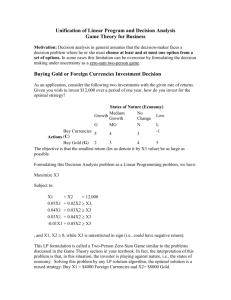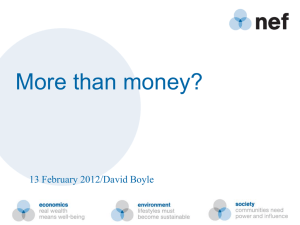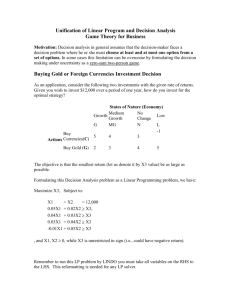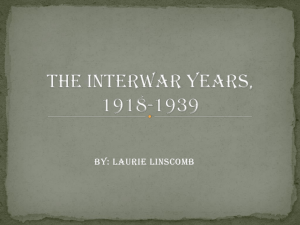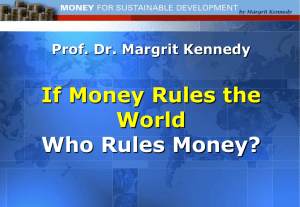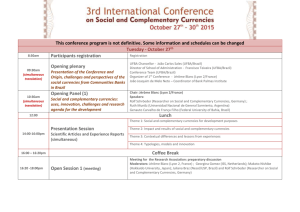Present
advertisement
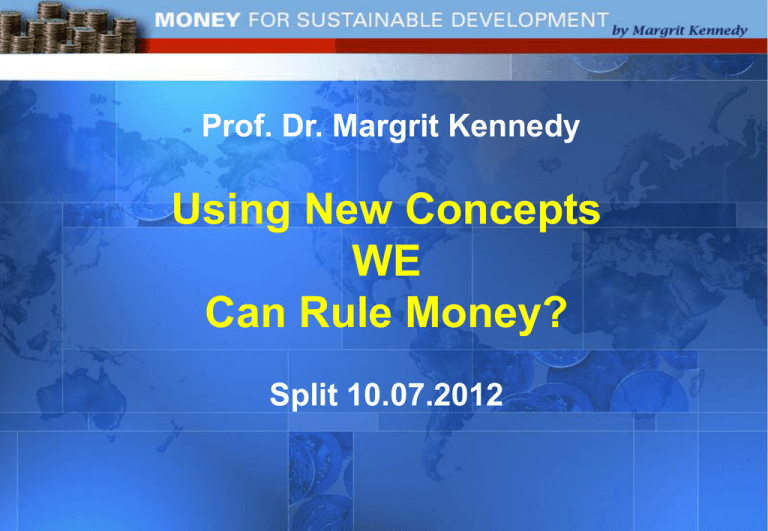
Prof. Dr. Margrit Kennedy Using New Concepts WE Can Rule Money? Split 10.07.2012 According to an IMF – Statistik 2011 between 1970 und 2007 we have had 124 banking crises 326 currency crises 64 debt crises Misconception 1: Zunahme Money with intereest and compound interest can grow forever c b There exist different growth patterns in the material realm a. natural growth alone can be termed sustainable a b. linear growth can be sustained temporarily Zeit c. exponentielles growth is soon coming to an end 2. The Transparency Misconception Interest is paid only when we borrow money 1 Garbage Collection Fees Cost of interest on capital 12% 2 Drinking Water Costs Cost of interest on capital 38% 3 Rent in Public Housing Cost of interest on capital 77% Source: H Creutz Misconception 3: Everybody is treated equally in the system Interest payments and Interest gains show large disparities: 80% of the population pays twice as much as they gain 10% gain more than twice as much as they pay Source: H Creutz Continual Inflation Because of inflation, in the year 2001, every DM was worth only 20 Pfennigs… and this was the most stable currency in the world! Source: H Creutz 3500 Excessive Increase in Foreign Exchange Transactions 2500 2000 Speculative Real 1500 1000 500 0 19 74 19 80 19 83 19 86 19 89 19 92 19 95 19 98 20 01 20 04 20 07 Billions of US$ 3000 Year Source: Lietaer Of Human Wealth 2008 Exponentially growing Debt AND Assets French government debt as % of GDP: Official debt versus debt computed without interest 19792009 1979 government debt was € 239 billion or 21 per cent of its GDP 2009, this had risen to € 1,088 billion or 78 per cent of its GDP. Had Article 25 of the Law of 3 January 1973 not been in force, the French government would have saved €1,306 billion in interest by 2009, and the country’s total public debt would only be 8.6 per cent of its GDP. Components in Interest for Loans and Credit In the present money system In complementary money systems Bank Fees 1.7% Bank Fees 1.7% Risk Premium 0.8% Risk Premium 0.8% Liquidity Premium 4.0% Liquidity Premium 0.0% Inflationary Adjustment 1.5% Inflationary Adjustment 1.5% Total Total 8.0% 4.0% Comparison of Credit Costs for average German household with € 30.000 /year • interest costs of 40% • demurrage half of that € 12.000 / household /year € 6.000 / household /year Designing Complementary Currencies Creating new financial liquidity for a limited purpose LOCAL, REGIONAL and GLOBAL CURRENCIES or SECTORAL CURRENCIES Sectoral CURRENCIES two examples Fureai-Kippu System, Japan WIR Wirtschaftsring, Switzerland Fureai-Kippu = Care Tickets since 1995 in Japan supports care of elderly with help from younger people who get hour credits which can be used at a later date in another part of the country or by another person WIR-WIRTSCHAFTSRING PARALLEL CURRENCY SYSTEM among small and medium businesses since 1934 in Switzerland 15 Swiss regional WIR- organisations 60.000 members average turnover per year 1.6 bio WIR proves to have anti-cyclical effect supports policies of government REGIONAL CURRENCIES: • partial decoupling from globalized economy • increased use of regional products and services • added value and surpluses remain in the region • community keeps essential public utilities • closer links between consumer and producer • strengthening regional identity & diversity • reducing need for transport and energy A First Model for Regional Currencies: The Wörgl Experiment Results in 13,5 months between 1932 - 1933: 1. Unemployment reduced by 25% 2. Town-Income increased by 35% 3. Public works investment rose by 220% Regional money system based on vouchers Figures for 2011: Annual turnover 6 mio Euros 2.388 Members 600 Firms 200 Associations Donations 50.000 Chiemgauer Total since 2003 210.000 Chiemgauer These five villages are supporting members paying their fees A Solution to the financial crisis in Greece and other European countries developed by the initiators of the Chiemgauer http://www.eurorettung.org/ Express Money is unique in two ways: 1) Via its spending incentive - demurrage monetary circulation is accelerated stimulating the economy. Doubling monetary velocity doubles GNP. 2) Via the leakage inhibitor feature an exchange fee for conversion into euro money stays in the country strengthening its economy and reducing its trade deficit • more favorable interest rate than euro credits, thus facilitating economic investment. • quickly become the vehicle for domestic payment transactions. Differences between COMPLEMENTARY and TRADITIONAL currencies 1: use- instead of profit-oriented limited instead of general acceptance circulation incentive instead of interest transparent instead of obscure creation democratic instead of central control Differences between COMPLEMENTARY and TRADITIONAL currencies 2: inflation-resistant instead of inflation-prone promoting community instead of destroying it Differences between COMPLEMENTARY and TRADITIONAL currencies 3: a win-win solution for everybody instead of only ten percent of the population Sustainability of complex living systems Optimum 100% 0% Window of Vitality Resilience (Diversity + Interconnections) Efficiency (Streamlined) Sustainability of complex living systems Optimum 100% 0% Resilience (Diversity + Interconnections) Present Financial System Efficiency (Streamlined) Sustainability of complex living systems Optimum 100% 0% Effects of Complementary Currencies Resilience (Diversity + interconnections) Efficiency (Streamlined) My change of perspective between 1987 und 2012 New Society Publishers Gabriola Island, Canada August 2012 more on: www.margritkennedy.de www.monneta.org www.kennedy-library.info

